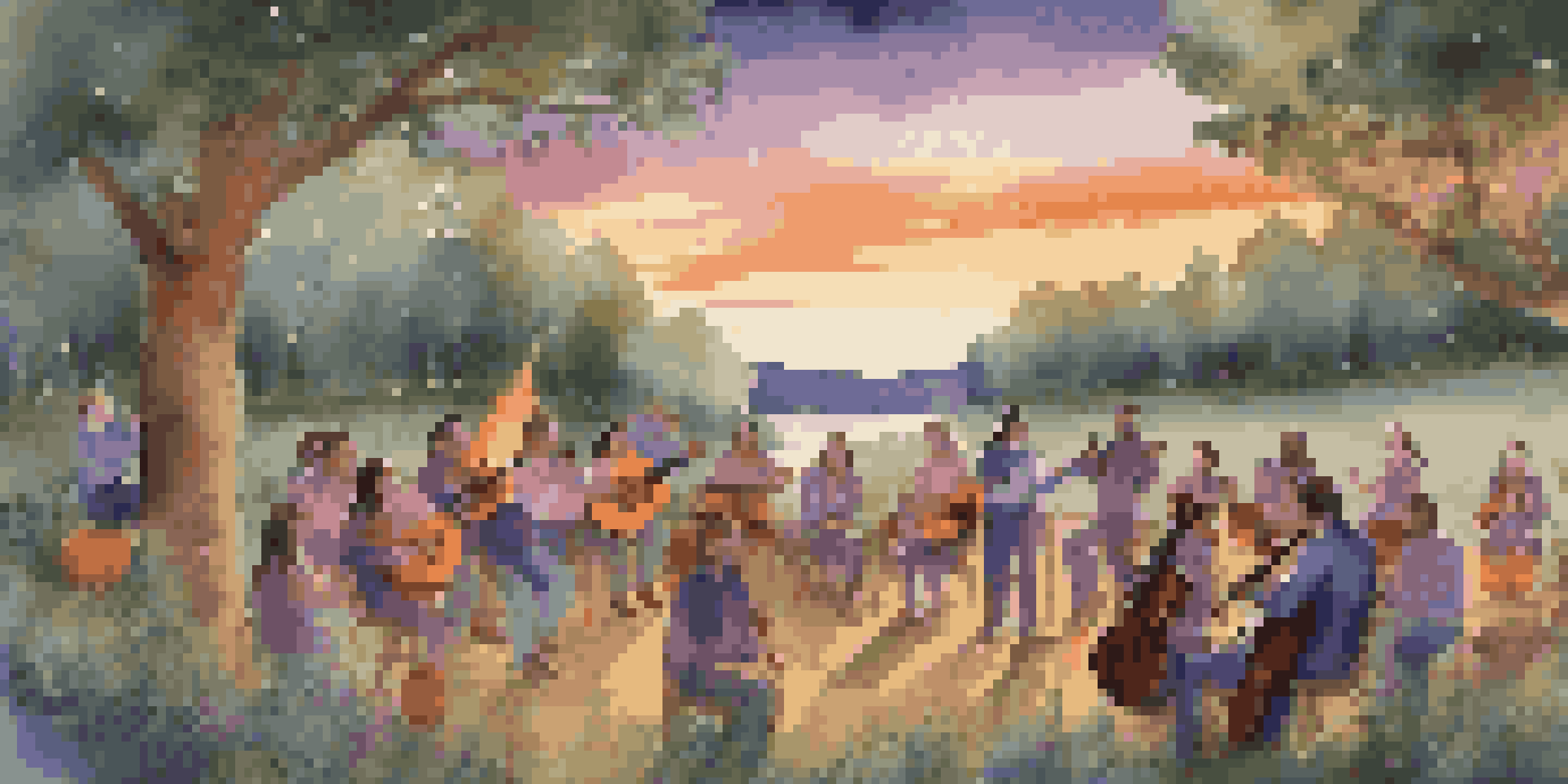The Role of Music in Cultural Identity: Historical Context

Understanding Cultural Identity Through Music
Cultural identity is often shaped by the sounds and rhythms that resonate with us. Music serves as a mirror, reflecting our values, beliefs, and experiences. When we hear a familiar tune, it can evoke memories and emotions tied to our heritage.
Music can change the world because it can change people.
For instance, think about how a traditional folk song can transport you to your childhood, surrounded by family and community. It's a powerful reminder of where we come from. This connection illustrates why music is such an integral part of cultural identity.
In many ways, music acts as a language of its own, communicating feelings that words sometimes cannot. It transcends boundaries and allows us to connect with our roots, making it a pivotal aspect of cultural expression.
Historical Evolution of Music and Culture
Music has evolved alongside societies, often reflecting historical contexts and changes. From ancient chants to modern pop, each era has contributed to the rich tapestry of cultural identity. These musical transformations tell stories about communities and their struggles.

Take, for example, the impact of the Civil Rights Movement in the United States. Songs like 'We Shall Overcome' became anthems of hope and resilience, uniting people under a common cause. Such historical moments highlight how music can rally communities and influence cultural identity.
Music Reflects Cultural Identity
Music serves as a mirror to our values and experiences, deeply connecting us to our cultural roots.
As we look back, we can see how music has served as a tool for both resistance and celebration, shaping the collective identity of various groups. Understanding this evolution helps us appreciate the depth of music's role in culture.
The Role of Folk Music in Cultural Preservation
Folk music is a key player in preserving cultural identity, acting as a vessel for storytelling and tradition. Passed down through generations, these songs often encapsulate the values and history of a community. They create a sense of belonging and continuity.
Where words fail, music speaks.
For example, Indigenous music often contains stories of creation and connection to the land, serving both an educational and spiritual purpose. These songs not only keep traditions alive but also allow younger generations to connect with their ancestry.
In a world that is rapidly changing, folk music provides a grounding force, reminding us of our roots. This preservation of culture through music is vital for maintaining a diverse and rich global heritage.
Globalization and Its Impact on Cultural Music
In our interconnected world, globalization has a profound impact on music and cultural identity. While it offers a platform for cultural exchange, it can also lead to the dilution of traditional sounds. This duality presents both opportunities and challenges.
Consider the rise of fusion genres, which blend elements from various cultures. These musical hybrids can promote understanding and appreciation across different backgrounds. However, they may also overshadow original forms, leading to concerns about cultural appropriation.
Folk Music Preserves Traditions
Folk music acts as a vessel for storytelling and cultural heritage, ensuring the continuity of community values across generations.
Navigating this complex landscape requires sensitivity and respect for the authenticity of cultural expressions. It's essential to celebrate diversity while also honoring the unique stories behind each musical tradition.
Music as a Tool for Social Change
Throughout history, music has played a pivotal role in social movements, acting as a catalyst for change. From protest songs to political anthems, music has the power to inspire and mobilize communities. It becomes a voice for those who feel unheard.
For example, the song 'Imagine' by John Lennon has inspired generations to envision a more peaceful world. It reflects a desire for unity and compassion, resonating deeply with those seeking social justice. This demonstrates how music can shape cultural identity and drive collective action.
When we sing together, we're not just making music; we're reinforcing our shared beliefs and values. This communal experience fosters solidarity and highlights music's role in advocating for change.
The Emotional Connection Between Music and Identity
Music has a unique ability to evoke deep emotional responses, which can significantly influence our sense of identity. The songs we love often reflect our personal experiences and the cultures we belong to. This emotional connection can be profoundly enriching.
For instance, think about how a particular song can instantly transport you back to a specific moment in your life, filled with joy or nostalgia. Such experiences shape how we view ourselves and our place within our cultural communities.
Globalization Reshapes Musical Identity
While globalization facilitates cultural exchange through music, it also poses challenges like the dilution of traditional sounds.
This emotional resonance is what makes music a vital part of our identity. It allows for personal expression while also connecting us to larger narratives within our cultures.
Future Trends: Music and Cultural Identity
As we look to the future, the relationship between music and cultural identity will continue to evolve. Emerging technologies, such as streaming platforms, are changing how we discover and interact with music. This shift has the potential to reshape cultural landscapes worldwide.
Moreover, the rise of social media allows artists to reach global audiences, blending cultural influences in unprecedented ways. These platforms can foster new forms of cultural expression while also preserving traditional sounds.

Ultimately, the future of music and cultural identity lies in our hands. By embracing both innovation and tradition, we can create a rich musical tapestry that honors our diverse histories while looking ahead to new possibilities.